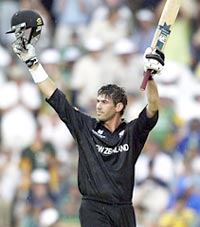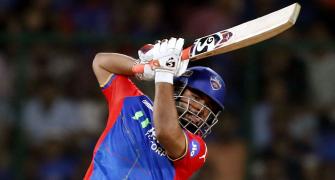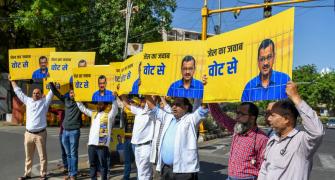Stephen Fleming was just 20 when he made his international debut, but the talent was obvious to all who witnessed his game. He was selected on basis of performances with the youth team and a few first class matches, and showed he had the temperament for the highest level.
There were questions about him graduating to the national side too early, but he answered his critics with a good showing in his early matches and cemented his place in the side.
A fine knock of 92 in the second innings of his debut Test, against India at Hamilton in March 1994, set the tone for a career that today sees him on the verge of an important milestone.
When he steps out on to the field against Pakistan in the Champions Trophy match in Mohali on Wednesday, he will surpass Arjuna Ranatunga's record of leading a country in the most one-day internationals. The match will be Fleming's 194th one-day international as captain, since taking over the New Zealand team after an injury to Lee Germon in 1997.
The soft-spoken left-hander was quick to dismiss the hype surrounding the record. Instead, he preferred to focus on the match, a virtual knock-out for his team.
"It's nice to achieve the record. But I would be more excited if we won the match against Pakistan tomorrow for a spot in the semi-finals. Personal milestones are satisfactory, but I have got a few things which I want to achieve with the team and one of them is to win this tournament," he said on Tuesday.
In a sport where a single bad result invites the wrath of a thousand critics, way back in 1997, Fleming may have never envisaged holding the skipper's job for so long. At 23, he was New Zealand's youngest captain and had little experience of the responsibility at hand when he was chosen for the job.
"I didn't know what I was doing in my first game, so that is probably a start of learning how to captain. My style of captaincy has gone 360 degrees and more. I have used different styles, developed different ways, used people we have had and also my beliefs. Probably now, with the advantage of hindsight I am at a point where I'm discovering just how important leadership can be. And that comes down to being in the job for so long. I am still discovering new techniques based on experience. And I was thankful to get all this experience," he says, recalling his first match as captain, in a Test against England in February 1997.
One of his greatest moments came when he led the team to victory at the 2001 ICC Knockout tournament, now known as the Champions Trophy. It was New Zealand's first victory at a one-day international tournament and it seemed they were destined for more. But a country that produces talented all-rounders at will hasn't done justice to their true potential, at least in the shorter version of the game.
"We are deservedly not favourites in this tournament, because we have not been consistent. What we have done in this tournament is a classic example of that. I think what we got to do is to become more consistent during big tournaments and big games in big series and that is when you lose the underdog tag," he said.
One of New Zealand's big regrets is not winning the World Cup, and Fleming is hoping to win it at least once in his long spell as leader.
"We have used the underdog tag to our advantage but it won't make us a better side. We just don't want to beat big teams, but we want to consistently beat big teams. In the last 24 months we have been in the top half of one-day teams. But we need to cement that and finish with a good World Cup. We have got a lot of time before we achieve what we are trying to achieve," Fleming said.
The youngest captain to lead New Zealand, Fleming says his drive and desire to lead the side is the same as it was on day one.
"I am still getting massive satisfaction from leading the New Zealand side. That's an important thing to acknowledge even after ten years -- my drive and desire to get better as a captain. It is as intense as it's always been from day one. I understand the shelf life talk but I have tried to be innovative, encourage leadership and it's something that's kept me energized," he said.
He also mentioned a few people, who helped him along the way in his quest to become a better leader.
 "Martin Crowe has always been there. He was an innovative captain and in my early days he was very supportive. Gilbert Enoka, a sports psychologist who now works with the All Blacks Rugby team was very helpful. Also John Graham was influential along with the other managers at that time. That was the time I was shaping the captain I wanted to be," Fleming said.
"Martin Crowe has always been there. He was an innovative captain and in my early days he was very supportive. Gilbert Enoka, a sports psychologist who now works with the All Blacks Rugby team was very helpful. Also John Graham was influential along with the other managers at that time. That was the time I was shaping the captain I wanted to be," Fleming said.
But it hasn't always been smooth sailing for the tall left-hander. A disastrous showing by New Zealand in the 2000-01 season saw the otherwise cool Fleming breakdown, and there were reports that he offered to step down from the captaincy; but he was retained and subsequently the team's performance took an upward curve in the months to follow.
"I never thought of quitting from the team, but to give up the captaincy for the betterment of the side is something I have grappled with. Ultimately the buck stops with me in the playing sense and you have to see if your captaincy is hindering or helping your game. Yes, I have thought of giving it up.
"The hardest time is when you are under pressure with both batting and captaincy. The bottom line is that I didn't want to give up even when the times were bad, I didn't want to give the opportunity up," he said.
But, with time, he has matured both as captain and batsman, and realises that it is his batting that comes first.
"It comes down to how you play as a batter. I'm certainly not as good a captain when I'm under pressure batting-wise. The decision-making is not confident as it should be when you are under pressure with your batting. I think I have been in the game long enough to know that I can set that aside and concentrate on my captaincy even if my batting is not going well," he added.
Fleming finds it difficult to pick up the high and lows as captain and believes the experience, whether good or bad, has helped him.
"I know a decade of cricket is a lot to go through and there have been some good moments and some soul-searching moments. That's what shapes you as a player and a person. I can't be thankful enough to be able to have the job for this long," he said.
Fleming is widely acknowledged for his thoughtfulness and man-management skills as a captain. Rarely have you heard of a rift among the Kiwis or a player being frustrated, but there is still a lot to achieve. One of his main tasks is to help his country groom a new leader, who will ultimately succeed him.
"I still have got a lot to achieve. I am not only looking to win this tournament, but also winning the World Cup, releasing more talent as a batter, leading the team well, encouraging the likes [Daniel] Vettori, [Jacob] Oram, [Shane] Bond, [Hamish] Marshall to develop their leadership along with me."
But could he imagine himself playing under someone else?
"It's a tough one to speculate on. It's become second nature. Some could argue that my presence in the side could be detrimental to future development but I'm sure that when that time comes about there will be a good robust discussion about the condition of the side and what I can and can't do."
He believes left-arm spinner Daniel Vettori is the best bet to take on as next captain of New Zealand.
"Vettori is the first name that comes up. He has captained the side when I have not played and he used the substitute rule very well then," he said.
Asked whether captaincy comes naturally, he replied: "You learn most of it. If you are observant, listen well, man-mangement is in order; then half of it sorted out. Then comes the tactical side and the development side. If you walk around thinking you are a leader, you are a long way from it."
A career spanning 103 Tests and 255 one-dayers in over 13 years, Fleming has done it all. There is still a burning desire to win the World Cup and he is not yet looking past cricket; not yet.
"You always think of life after cricket mindful of how you conduct yourself, view from outside. As far as occupation after cricket, I'm not sure what's there after cricket," he said, before signing off.








